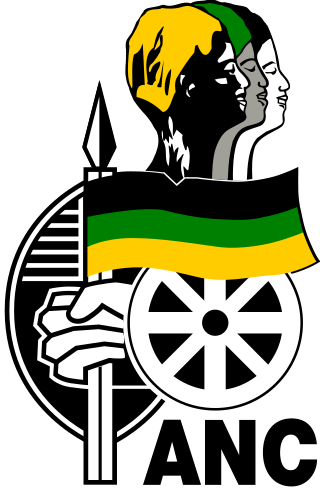Related Research Articles
Feminist science fiction is a subgenre of science fiction focused on such feminist themes as:gender inequality,sexuality,race,economics,reproduction,and environment. Feminist SF is political because of its tendency to critique the dominant culture. Some of the most notable feminist science fiction works have illustrated these themes using utopias to explore a society in which gender differences or gender power imbalances do not exist,or dystopias to explore worlds in which gender inequalities are intensified,thus asserting a need for feminist work to continue.
Science fiction and fantasy serve as important vehicles for feminist thought,particularly as bridges between theory and practice. No other genres so actively invite representations of the ultimate goals of feminism:worlds free of sexism,worlds in which women's contributions are recognized and valued,worlds that explore the diversity of women's desire and sexuality,and worlds that move beyond gender.
Affirmative action,also known as positive action or positive discrimination,involves sets of policies and practices within a government or organization seeking to benefit particular groups that were historically discriminated against in areas in which such groups are underrepresented,mistreated or suffer from lack of public support—such as education and employment. Historically and internationally,support for affirmative action has sought to achieve goals such as bridging inequalities in employment and pay,increasing access to education,promoting diversity,and redressing wrongs,harms,or hindrances.
Triple oppression,also called double jeopardy,Jane Crow,or triple exploitation,is a theory developed by black socialists in the United States,such as Claudia Jones. The theory states that a connection exists between various types of oppression,specifically classism,racism,and sexism. It hypothesizes that all three types of oppression need to be overcome at once.

A glass ceiling is a metaphor usually applied to people of marginalized genders,used to represent an invisible barrier that prevents an oppressed demographic from rising beyond a certain level in a hierarchy. No matter how invisible the glass ceiling is expressed,it is actually an obstacle difficult to overcome. The metaphor was first used by feminists in reference to barriers in the careers of high-achieving women. It was coined by Marilyn Loden during a speech in 1978.
Oppression is malicious or unjust treatment of,or exercise of power over,a group of individuals,often in the form of governmental authority or cultural opprobrium. It is related to regimentation,class,society,and punishment. Oppression may be overt or covert,depending on how it is practiced. Oppression refers to discrimination when the injustice does not target and may not directly afflict everyone in society but instead targets or disproportionately impacts specific groups of people.

Nkosazana Clarice Dlamini-Zuma,sometimes referred to by her initials NDZ,is a South African politician,medical doctor and former anti-apartheid activist. A longstanding member of the African National Congress (ANC),she currently serves as Minister in the Presidency responsible for Women,Youth and Persons with Disabilities and is the Chancellor of the University of Limpopo.

Sheryl Kara Sandberg is an American technology executive,philanthropist,and writer. Sandberg served as chief operating officer (COO) of Meta Platforms,a position from which she stepped down in August 2022. She is also the founder of LeanIn.Org. In 2008,she was made COO at Facebook,becoming the company's second-highest-ranking official. In June 2012,she was elected to Facebook's board of directors,becoming the first woman to serve on its board. As head of the company's advertising business,Sandberg was credited for making the company profitable. Prior to joining Facebook as its COO,Sandberg was vice president of global online sales and operations at Google and was involved in its philanthropic arm Google.org. Before that,Sandberg served as research assistant to Lawrence Summers at the World Bank,and subsequently as his chief of staff when he was Bill Clinton's United States Secretary of the Treasury.

Equality before the law,also known as equality under the law,equality in the eyes of the law,legal equality,or legal egalitarianism,is the principle that all people must be equally protected by the law. The principle requires a systematic rule of law that observes due process to provide equal justice,and requires equal protection ensuring that no individual nor group of individuals be privileged over others by the law. Sometimes called the principle of isonomy,it arises from various philosophical questions concerning equality,fairness and justice. Equality before the law is one of the basic principles of some definitions of liberalism. It is incompatible with legal slavery.

Indra Nooyi is an Indian-American business executive who was the chairperson and chief executive officer (CEO) of PepsiCo.

The roles of women in the Arab world have changed throughout history,as the culture and society in which they live has undergone significant transformations. Historically,as well as presently,the situation of women differs greatly between Arabic speaking regions,their urban or rural population and age groups. Among other factors,these differences can be attributed to local traditions,culture and religion,women's social or legal status,their level of education,health or self-awareness. Since the 19th century,and notably through the influence of the colonization in North Africa,the Arab Renaissance in Egypt,Lebanon,and Syria,and the end of the Ottoman Empire,the social and economic changes in the Arab world have become greatly accelerated and diversified.

KimberléWilliams Crenshaw is an American civil rights advocate and a leading scholar of using critical race theory as a lens to further explore and examine the Tulsa race massacre. She is a professor at the UCLA School of Law and Columbia Law School,where she specializes in race and gender issues.

The African National Congress Women's League (ANCWL) is an auxiliary women's political organization of the African National Congress (ANC) of South Africa. This organization has its precedent in the Bantu Women's League,and it oscillated from being the Women's Section to the Women's League from its founding,through the exile years,and in a post-apartheid South Africa. After women were allowed to become members of the ANC in 1943,the ANCWL was created as the means by which Black South African women could contribute to the national liberation struggle by channeling Black women's political activity into the ANC by way of the ANCWL.
Educational equity,also known as equity in education,is a measure of achievement,fairness,and opportunity in education. The study of education equity is often linked with the study of excellence and equity.

Bathabile Dlamini is a South African politician who was the President of the African National Congress (ANC) Women's League from 2015 to 2022. She was previously the Minister in the Presidency for Women from 2018 to 2019 and the Minister of Social Development from 2010 to 2018.
Women in positions of power are women who hold an occupation that gives them great authority,influence,and/or responsibility in government or in businesses. Historically,power has been distributed among the sexes disparately. Power and powerful positions have most often been associated with men as opposed to women. As gender equality increases,women hold more and more powerful positions in different sectors of human endeavors.

Women's empowerment may be defined in several ways,including accepting women's viewpoints,making an effort to seek them and raising the status of women through education,awareness,literacy,and training. Women's empowerment equips and allows women to make life-determining decisions through the different societal problems. They may have the opportunity to re-define gender roles or other such roles,which allow them more freedom to pursue desired goals.

Zuriel Elise Oduwole is an American education advocate and film maker best known for her works on the advocacy for the education of girls in Africa. Her advocacy has since made her in the summer of 2013 at the age of 10,the youngest person to be profiled by Forbes. In November 2014,at age 12,Zuriel became the world's youngest filmmaker to have a self-produced and self-edited work screened,after her film showed in two movie chains,and then went on to show in Ghana,England,South Africa,and Japan.

Precious Moloi-Motsepe is a South African philanthropist and fashion entrepreneur. One of the richest women in South Africa she started her career as a medical practitioner,specializing in children and women's health. In September 2019 she was elected Chancellor of the University of Cape Town,succeeding Graça Machel,and beginning her ten-year term on 1 January.

Gender pay gap in sports is the persistence of unequal pay in sports,particularly for female athletes who do not receive equal revenue compared to their counterparts,which differs depending on the sport. According to the research conducted by BBC,"a total of 83% of sports now reward men and women equally". However,it does not mean that the wage gap in sports has narrowed or disappeared. In 2018,Forbes released the list of the top 100 highest-paid athletes,all of them being male athletes. A similar situation also occurred in 2017,where there was only one female athlete –tennis player Serena Williams —who joined the list and ranked No.56. Billie Jean King brought awareness to the issue of unequal pay in the early 1970s,when she was awarded $2,900 less than her male counterpart at the Italian Open. The timeline of the gender pay gap in sports displays the significant events that have occurred since the 1970s.

African American women played a variety of important roles in the civil rights movement. They served as leaders,demonstrators,organizers,fundraisers,theorists,formed abolition and self-help societies. They also created and published newspapers,poems,and stories about how they are treated and it paved the way for the modern civil rights movement. They were judged by the color of their skin,as well as being discriminated against society because they are women. African American women faced two struggles,both sexism and racism. Womanism fully encompasses the intersectionality between these two social barriers,thus encompassing African American female involvement in the civil rights movement. African American women led organizations and struggles for their suffrage,anti-lynching laws,full employment and especially against the Jim Crow Laws. They had to constantly fight for equality and needed to have a voice in what they can do in society. Black women served a special role as "bridge leaders," forming connections between those in formal positions of power and political constituents. They were the middle person going back and forth between the two groups and provided information to them. African American women actively participated in community organizing and took on informal leadership roles,making substantial grassroots contributions to the movement. They were essential in energizing the neighborhood,planning activities,and building relationships between neighbors. Black women provided crucial safe spaces for activists to plan,strategize,and discuss important problems by hosting meetings and gatherings in their homes. When coordinating activities was not safe or feasible in public locations,this kind of grassroots involvement was especially crucial. The experiences of Black women during the CRM were more nuanced due to the confluence of gender and race. They had to navigate issues of race and gender,and they occasionally encountered prejudice inside the civil rights movement as well as in larger society. Notwithstanding these obstacles,African American women persevered in their endeavors,making a substantial contribution to the movement's eventual triumph. Their leadership and activity opened doors for later generations and demonstrated how important it is to acknowledge and value the diverse roles that Black women have played in the struggle for racial justice and equality. A major turning point was the Montgomery Bus Boycott of 1955,which followed Rosa Park's bold move of not giving up her bus seat. Several notable African American female activists and organizations emerged from this movement,making essential gains in the civil rights agenda,despite restricted access to power and the Cold War atmosphere pushing for silence within the United States.
References
- ↑ "Company Overview of Imithi Investments (Pty) Ltd". Bloomberg. 22 December 2018. Retrieved 22 December 2018.
- ↑ Africa, Forbes (6 March 2020). "Africa's 50 Most Powerful Women". Forbes Africa. Retrieved 30 January 2021.
- ↑ McGrath, Maggie. "50 Over 50: EMEA 2022". Forbes. Retrieved 25 August 2022.
- ↑ "Amazon.com : Judy Dlamini". www.amazon.com. Retrieved 20 May 2021.
- ↑ "Amazon.com : Judy Dlamini". www.amazon.com. Retrieved 20 May 2021.
- ↑ "Amazon.com : Judy Dlamini". www.amazon.com. Retrieved 20 May 2021.
- ↑ Dlamini, Judy (2016). Equal But Different: Women Leader's Life Stories, Overcoming Race, Gender and Social Class. Sifiso Publishers. ISBN 978-0-620-72587-3.